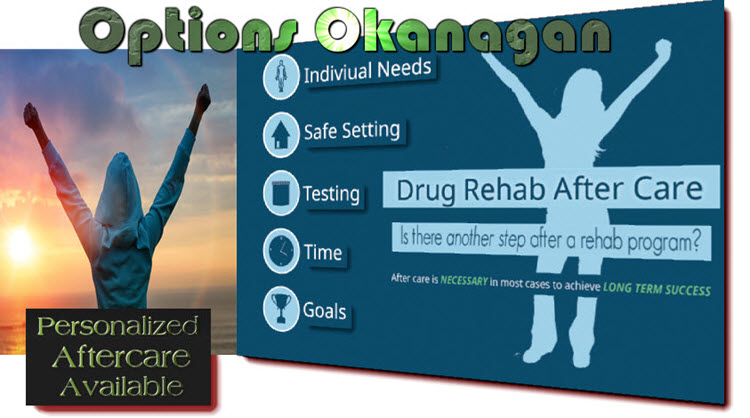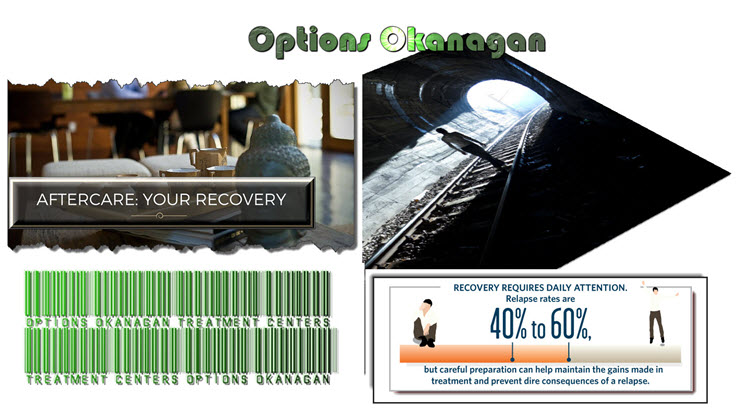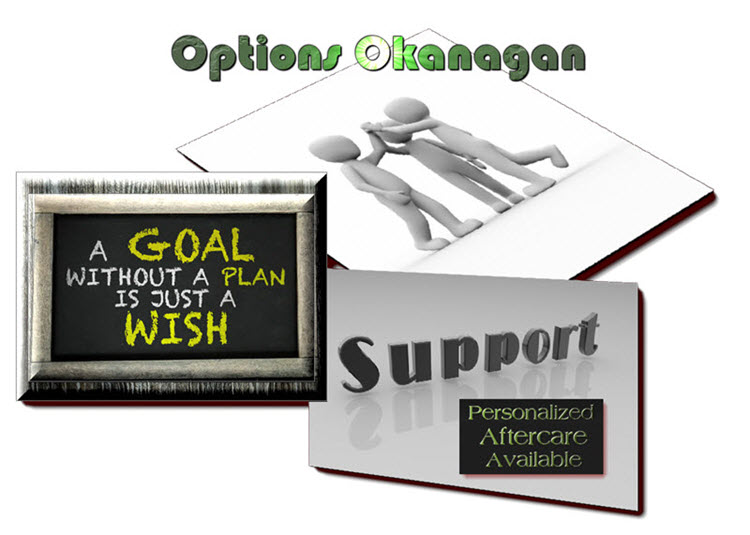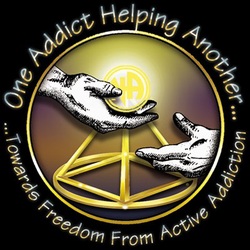Aftercare Programs
Why Aftercare Is Crucial For Your Treatment
Aftercare: A Commitment For Life
Recovering from addiction will take more than a simple 4-6 week treatment program. It is a process that will continue for the rest of the person's life. The steps that are taken in the early months after completing treatment can be crucial when it comes to whether the person stays sober for life or is destined to relapse. Once formal treatment is complete, aftercare should be the next consideration.
Programs Vary When It Comes To Aftercare
While the primary goal of any aftercare program is preventing relapse, the exact nature of the program can vary greatly based on a number of factors. For some people, attending a weekly support group that is led by a qualified counselor will help provide needed support and referrals once rehab is completed. These meetings allow the members of the group to bond with each other, as well as the counselor, to form a network of support.
For others, it may be more beneficial to move into a transitional living space upon completion of a rehabilitation program. Transitional living is useful for anyone who has completed an intensive inpatient program but may not be ready to live on their own just yet. Having regular meetings with a mentor or sponsor is also crucial for support.
Who Could Benefit From Aftercare?
Over 30 million people across North America struggle with addiction or substance abuse. However, just over 3 million of these individuals will attend treatment in a rehabilitation center that specializes in addiction. That is just 11 percent. While treatment for addiction is essential, the need for adequate aftercare is just as important. Even after rehabilitation, often an individual will struggle with substance abuse issues. Learning to deal with everyday life and its stresses takes time.
Having a good aftercare program can make the difference when it comes to reducing the chance of a relapse. Every day 10,000 people start using a drug, and often they are under 18 years of age.
In recent years, specialists in addiction have begun to recognize that relapse is a major symptom of an addiction problem. People who also have additional disorders are at a higher risk of relapsing and can also greatly benefit from a good aftercare program to prevent that.
a) More than 10 million people (11.8 to be exact) across North America have a mental disorder in addition to their substance abuse problem.
b) Unfortunately, less than 10 percent of these people will have both conditions treated and half receive no treatment at all.
c) Adults who suffer from a mental illness have an increased likelihood of bingeing on alcohol or report using alcohol heavily.
Benefits of Aftercare
By providing an opportunity for continued support, counseling, or transitional living, programs for aftercare give individuals another layer of accountability that stands between them and returning to their substance of choice. These programs are a safe place where individuals can connect with other recovering addicts, gaining advice for coping with temptation and stress, hearing motivational speakers, and finding a mentor or sponsor.
Aftercare programs are also quite useful for the family and friends of those suffering from addiction issues. Many services include counseling sessions for the spouse, parents, children, or partners of the person with the addiction problem. Group therapy and educational seminars on the link between mental disorders and substance abuse can also serve as a great resource for friends and family. Family members are also welcome at various 12-step programs such as meetings of Narcotics Anonymous or Alcoholics Anonymous; both have material tailored especially for family of the recovering addicts. These meetings serve as a place where family members can safely share their experience with addiction and gain the support of others in similar situations.
Finding The Right Program
If an aftercare program is to be effective, it must be tailored individually to the person. These types of plans usually are created as a joint effort between the individual and addiction specialist or counselor before they are discharged from their rehabilitation program. How complex the plan is will depend on what the person needs, what their home life is like, the environment they will be returning to, and their risk of relapse. The less that is left to chance, the better. Without a concrete plan, it is very easy for an individual to relapse and take up old habits. The aim of a good aftercare plan is to leave nothing to chance.
Basic Steps In Aftercare
No two aftercare plans will be identical; however, these basic steps are usually a part of the program.
1) Continuing therapy. Having therapy sessions continue beyond the period in the rehabilitation center will allow a person to continue working on any issues that they have that might have contributed to their addictions. Individuals who are new to recovery will have a greater chance of attending regular programs for recovery if they have someone to be accountable to.
2) Learning Triggers. A person needs to learn what triggers their use and how they can cope with them through workshops, group therapy, lectures, or individual therapy sessions, there are many different factors, psychological, social, or environmental in nature, that could trigger someone to return to their addiction. A loved one's sudden death, losing their job, PTSD, or any sudden extreme sensation or emotion has a risk of driving someone to relapse. While initial discovery of these triggers may begin during their stay at rehab, returning to their normal life may trigger a host of new problems. This is where the importance of understanding triggers comes in during aftercare.
3) Coping with cravings and stress. After leaving rehab, a person may face a situation that they didn't anticipate while in treatment. Even a good experience, like a new job, can cause stress and trigger a craving for their substance of choice. Aftercare programs include teaching skills on how to cope with stress and deal with cravings. Regular attendance at counseling or support groups will give additional structure to the person's life, so when stress hits, they can reach out to their support system and reduce their chances of relapse.
4) Preventing relapse. Nobody is perfect. Even a person who is committed to recovery can suffer from a relapse, whether as small as a sip of alcohol or as large as using again. A lapse might appear to be minor, however, they can cause a very fast spiral downwards into relapse and substance abuse. A major part of an aftercare plan will be a plan for what to do if the person relapses. They should list 5 people who they can contact, such as a sober friend or sponsor, and 5 steps they can take to stop the abuse immediately, such as asking for a ride away from the situation or attending a support meeting. Thinking of the possible outcomes in case of relapse and having a plan in place to address any mistakes can reduce the chances that the person will seriously relapse.
When Transitional Living Is Right For Aftercare
Sometimes it is possible for a person to return home after completing their treatment program at a rehabilitation center. If they have family and friends or even neighbors and coworkers who support their recovery, there is a support network in place. They should still have access to outpatient aftercare, including group meetings, therapy, and a sponsor. Others, however, might not have a very supportive network waiting for them after they finish their inpatient program.
They may not have a job to go back to or enough money to cover expenses. Their home life may be negative, or they may not have a home at all. Others simply might not feel ready to return to their everyday life, feeling overwhelmed by the reality of sobriety. For these people, a transitional living situation can give them a chance to smoothly move from inpatient rehab to living independently.
Explaining Extended Care
Patients in an extended care facility usually live in an environment that is supervised, but feels home-like. If an individual feels tempted to relapse, they have access to either a counselor, therapist, or fellow recovering addict at their fingertips. A transitional living situation includes access to a house manager and counselor, and often the manager is an addiction specialist or former addict themselves.
Help Is Available Round-The-Clock
Individuals often benefit from having support available anytime they need it. Meetings are often held daily, and there are many opportunities for discussion of feelings, hopes, and fears in order to work out any problems that arise. Residents in a program also serve as a source of encouragement and support, establishing a community and sense of fellowship. While a transitional community has less structure than an inpatient treatment facility, they still have fixed rules that establish a sense of stability.
Housemates often share chores, taking turns cleaning and cooking. These chores not only maintain the house, they impart a sense of routine and structure that is essential for someone just out of rehab. The members of the household also must follow rules on curfew and meeting attendance.
Besides their daily chores, individuals who live in transitional housing can choose to take classes to improve life skills. These can vary from parenting classes to workshops to refine a resume. The classes will help the individual learn the skills they will need and haven't had a chance to master on their own due to their addiction. In addition, if the person is currently unemployed, a transitional home is more affordable while providing essential stability as they search for a new job.
How To Succeed
Willingness To Change, Openness, and Honesty.
Nobody can complete addiction treatment in place of the person with the addiction, and even excellent centers will not succeed if the patient is not willing to commit to their own treatment. They must be open and honest, and willing to do the work that will be needed.
a) It is important to do major soul searching, and face any demons in the past. Be honest with any emotions that come up, regardless of how painful they are. It is important to embrace even the unpleasant feelings, as it is a necessary part of recovery. It might be wise to make a list of the experiences that come up, so they can be discussed with a counselor. It is important to be honest and get to the root of the cause of the abuse. An objective look at the events of the past can bring insight when examined by a skilled therapist or couselor and is essential to succeed.
b) Observe and listen to others. Others have valuable knowledge and experience that can help. Even if the topic at hand doesn't seem relevant, for example, a person sharing their abuse of prescription medication when the individual is dealing with addiction to alcohol, there is still useful information that can be gleaned from the other's experiences. Listening closely during meetings and group sessions is just as important as feelings and experiences that the individual experienced.
c) Share experiences, feelings, and thoughts that come up during the recovery process, even if they seem awkward or embarrassing. Some people might find relief in sharing their pain, however, others are self-conscious, and want to share as little as they can get away with. Not being willing to share honest and open observations and experiences sets a person up to fail and can even sabotage efforts at recovery. It is important to be willing to share, even if it seems uncomfortable.
Next Steps In Aftercare
Recovery takes time and shouldn't be rushed. Even with the support of a good aftercare program and transitional home, relapses can still happen, especially in the time immediately following leaving rehab. For example, in a survey of members of Alcoholics Anonymous, it was found that 4 out of 5 people had a relapse during the first year of recovery. However, once the five-year mark was reached, the chance of relapse drops to just 8 percent. This survey shows just how important it is for an individual to continue with their aftercare, even if a relapse occurs.
Relapse Does Not Mean Failure
A relapse event doesn't necessarily mean that the aftercare program failed, it just means that treatment is not done. Sobriety is something that can only be achieved day by day. Having an aftercare program such as a transitional home can help a person stay committed and reach their goals. If an individual also suffers from other mental disorders, aftercare is a great time to address these and start a treatment program to address them in addition to the problems with addiction.
Aftercare increases the chance of success. For example, alcohol dependence rates decreased by 3 million cases in 2014. While there could be several reasons for the decrease, one is undoubtedly the increase in aftercare options within treatment programs. For unemployed individuals, a transitional home also provides a place to live, stability, and much needed support as they search for a job. From group therapy to specialized living situation, aftercare provides much-needed assistance during the vital period just after inpatient rehab. It also provides assistance in maintaining sobriety and getting help in the case of a relapse.






